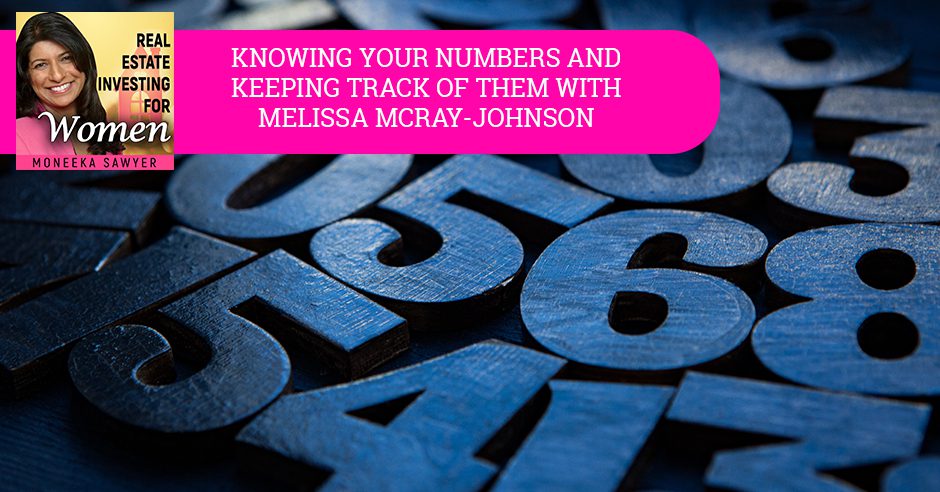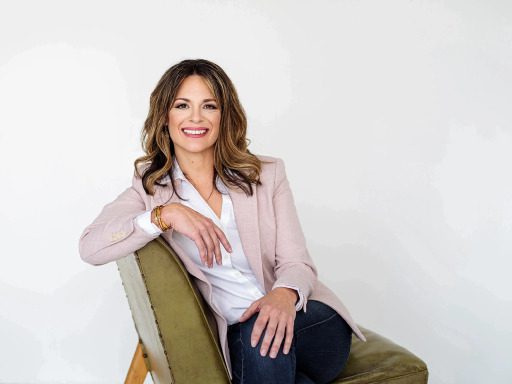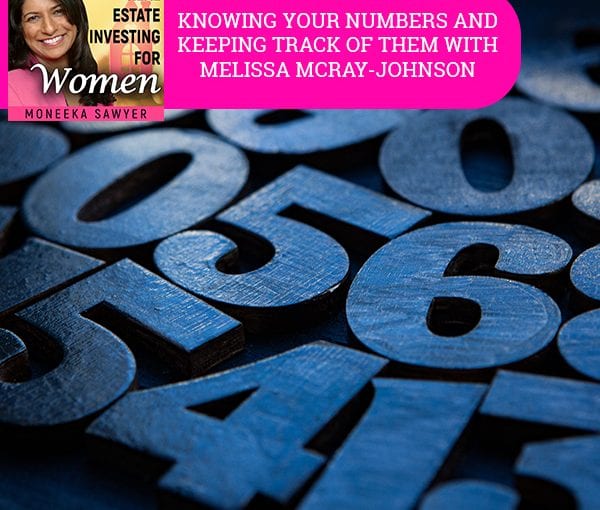Knowing Your Numbers And Keeping Track Of Them With Melissa McRay-Johnson – Real Estate Women

When you know your numbers, you can map the business deal in your head, and you’re able to make smart business decisions on where to spend your money. Joining Moneeka Sawyer in today’s episode is Melissa McRay-Johnson, the Founder of E3 Coaching, LLC. Melissa further explains the importance of knowing your numbers and keeping track of everything to your success. Are your numbers going where you expect them to go? Tune in and learn from this discussion on how you can stay on top of your business.
—
Listen to the podcast here
Knowing Your Numbers And Keeping Track Of Them With Melissa McRay-Johnson – Real Estate Women
Real Estate Investing For Women
I am excited to welcome to the show, Melissa Johnson. Melissa has been flipping houses in San Antonio, Texas since 2003, growing and expanding the business into a thriving real estate investment operation. With over 1,000 houses flipped, she has also built a portfolio of rental properties and real estate notes while raising five children. She provides coaching support and education for other high-level real estate investors nationwide. As a Co-founder of the San Antonio InvestHer meetup group and an active member of the Forbes Council on Real Estate and the National Association of Women Business Owners, she is dedicated to the success and empowerment of women in business. Melissa, welcome to the show.
Thank you. I’m excited.
This is going to be a great conversation. This is a marketing conversation, right?
Yes. I love marketing.
I’m excited to have someone on the show that’s an active investor who is also going to be talking about marketing. There is a lot of crossover, but most of the time I have a marketing person on the show, they’re not an investor. I’m super excited about what you have to offer to my audience. Could you give me a high-level story about how you got into doing what you’re doing?

Knowing Your Numbers: Run the numbers ahead of time to see how you can map it all out.
Back in 2003, real estate was not on my radar at all. I was always interested in real estate, but I thought maybe an agent. I didn’t follow through with that at the time. I was working for a defense contractor and my husband at the time, his father was investing in real estate. We spent a lot of time with him and it seemed like he was having this great time all the time, traveling in his RV, taking time off and getting all these doors, rental properties and stuff. I’m like, “That’s pretty cool.” We talked about it and said, “Why don’t we try it? This could be something good for us.” It sounds fun. It’d be great to be our own boss and get out of the cubicle life. We started down that road pretty simply at first, doing it part-time while we were working. Eventually, my husband ended up getting laid off because we worked for the government and there were issues with contracts and stuff like that. It’s two weeks before our wedding, so I wasn’t freaked out at all. I was.
We rolled with it and we thought, “Maybe this is a push, we needed to do this full-time.” He went full-time. I stayed at the job for about six more months was about all I could handle. Before the jealousy, “This isn’t fair. I don’t want to be sitting at this desk, you’re out running, having fun and I’m here. It’s miserable.” I then quit. I have pretty much been doing that ever since doing different exit strategies. I have been rehabbing for many years, I’m building a portfolio again of the rental properties. I love notes, creating notes. The last few years I have been more focused on wholesaling because it has seemed to fit well with the way the market was going and stuff like that. A little bit of everything I’ve done throughout the years. I’m still real estate investing, but I am also moved into more of a coaching and mentoring space, which I’m enjoying. That was born out of this whole COVID thing. Time to reevaluate life, “What do I want to do?” I got divorced. That was a rough thing to go through. It was a time to reevaluate everything. Things are looking good now.
Tell me, what do you mean by you create notes?
I know a lot of people having rental properties and things like that, but I love doing seller financing and creating notes from that. It’s a great way for you to get passive income without all the headaches of the rental properties. With rentals, you’ve always got to worry about maintenance and there are taxes. Those calls, “Something is broken,” and the big-ticket things that have to be done. Maintaining all that stuff is a lot. What we found was that by creating notes, you’re still getting that passive income, except you’re making money now in a cool way because you’re collecting interest. You’re not on the hook for taxes or insurance. I hold back escrow for those things. That strategy has been nice, but I do have rentals too because it’s good to have a balanced portfolio, rentals for the depreciation, things like that. The notes for creating that long-term stuff. What I liked doing is creating these notes, buying a property on a very short-term note for me, and then selling it on a 30-year note to an end buyer. Once my short-term notes paid off, it’s all gravy after that.
Take the time to reevaluate your life. Share on XWhen you purchase it, you have the seller that’s selling it to you, carry back the note?
No. I get my own financing and what I do is it’s called a wrap. It’s a wraparound mortgage. I’ve got a very short again, like a five-year note for that property. I’ll buy it. I’ll fix it up and then, be into it for X amount of dollars. I turn around and sell it for full retail to an end buyer, charge more interest than what I’m paying so that my payment is always covered every month. I don’t make a whole lot initially, but after that five-year period, then it’s free and clear. It’s checks in the mail every month.
I’m sorry to delve in. We weren’t planning on talking about this, but it’s so cool.
It’s one of my favorite exit strategies.
Let’s say for instance, you purchase it, you get financing and you’re going to pay it off in five years. Let’s say for the sake of argument, you might get a loan for 3% or 3.5%, then you’re going to sell that on a 30-year note. I know that this is not your number, as you can tell me if I’m correct or not, but something closer to 7% or 8%. If you’re selling that note at 7% or 8%, does that cover the payment of your shorter-term note upfront?
That’s what I always want to make sure that is happening, but yes. I’m buying at a such a deep discount. I’m into the property for so much less than what it’s selling for. I make sure when I run all the numbers when I run out of the scenario, I want to make sure that payment is covered because I’m collecting a down payment too from those end buyers also. That’s putting cash in my pocket too, which is nice. Their mortgage is always covering mine as a minimum. Sometimes there’s more. I make more, but I never pay less if that makes sense. I know in my mind I can run the numbers ahead of time to see I can map it all out. That’s part of the deal analysis, buying these things to make sure that, “If I buy this property for this much into it, I know my interest rate is this much. I want to finance it for this long and it’s going to sell for this much at this interest rate for this amount of time.” I can check all those numbers ahead of time before I even buy the house to make sure.
How much down payment do you usually take? Is it a percentage or is it what they can afford? How do you determine that?
It’s what they can afford. There are a lot of different ways of doing it. I don’t do super-expensive houses. I’m trying to do those deals in certain areas where it’s hardworking middle-class people. They want to own a home. Maybe their credit is not that great, or they can’t get a loan from a bank traditionally. Although I always tell them if you’re able to qualify down the road, feel free, go refinance. They can refinance at any time through a bank and get a lower interest rate when their credit improves or whatever and then I get cashed out. It’s a win-win either way. That’s the approach there.

Knowing Your Numbers: You can be creative with your marketing. It’s fun to try, test, and measure new things.
How do you get the houses? Do you get them through auction or do you have a strategy around that?
All of my marketing is all direct to sellers. I don’t buy off the MLS. I don’t buy from other wholesalers. I’m not buying at auctions or anything like that. It’s strictly direct from sellers.
That gets to the marketing piece. The conversation has been fascinating so far just about to get better. Talk to us a little bit about marketing for investors and what that looks like.
It looks amazing. I love marketing. I love it because it’s creative. You can be creative with your marketing. It’s fun to try, test, and measure new things. That’s always a cool thing to do. I like being very focused on marketing. Some people will do direct mail and they’re like blasting stuff out all over the place. I did that for a while and that shotgun approach works sometimes, but I’ve learned over the years, how to be more focused with things and how to tighten things up. I like stuff simple, efficient and very clear. That works in all aspects of my business, especially with marketing. What I’ve done is chosen certain marketing channels to do and then tracking all of those things.
Marketing is cool because there are many aspects to it. You can launch a campaign and maybe you get nothing. You can launch another campaign and it rocks. It’s like, “What worked? What didn’t work? What am I measuring? Do I need to change my message?” There are many different pieces to it. If something is not hitting, it’s like, “Am I not hitting the right people? Is there something wrong with my message?” A lot of different things play into that. It’s very important when you’re doing marketing to pick those few things and make sure you’re tracking them to see how they’re working because marketing is where we spend most of our money. Without marketing, you get no leads. You have no deals and then you have no business. Marketing is critical.
Tell me a little bit about the specifics. Where do you market or how do you do that marketing? Give me a little bit more detail on that.
I’ve done a lot of things over the years and what I’ve noticed is that things come and go. Something that works ten years ago isn’t going to work now necessarily but it could come back. I tell clients this all the time, like with direct mail. It was good for a while and then, it wasn’t so great. Now, it’s making a comeback again. We used to do billboards and Yellow Page ads. Yellow Page ads were kicking back in the day. We get a lot of deals out of this.
For people who are like, “What’s the Yellow Pages?”
“Isn’t that online?” These are like the straight-up phone book where you just turn the pages. That was a very effective marketing technique back then. Not so much anymore. I love online marketing. That’s been a big one for us. I’m back to direct mail again. Those are the two biggest places that I like to spend my time and referrals. I love referrals. Once you’ve been doing this for so long, because I’ve been doing this for many years now, so you build a reputation over that time. The great thing about that is you’ve sold a lot of houses in that amount of time. That’s a lot of people you’ve reached that are right for referrals. The last couple of deals that we’ve got have been strictly from referrals, not from any specific marketing that we’ve done, from them having a great experience. We were very conscious about the experience that we give the sellers.
When you're first getting started, always start simple. Share on XWe make sure we communicate with them all the time and things like that. When you get that good experience, you get a good referral. If I get a referral, I’ll film $500 as a thank you. They’re not going into it with the expectation. They’re going to get anything, but it’s a great place to get more deals is through your referrals. Referrals, online, and direct mail. I like to play with all those three things together. Even when I’m doing a direct mail campaign, I’ve always got links to the website and things like that in there and vice versa. With the website, I’m always trying to provide information, good content, and things like that. It all works together. I’ll use those things from the website and the direct mail too. I’ll pull a testimonial. If I’m hitting probates, I’ll pull a testimonial from probate and put it in the mail piece. It all works well when you use them all together.
Talk to me a little bit more about online marketing. You have a website. Tell me a little bit more about how the whole thing works.
Nowadays, you have to have an online presence. It’s tough to have a business when you don’t have an online presence because that’s where everybody goes now. They don’t go to the Yellow Pages anymore. If they want to know about you, they’re going to search online. That’s the first place people go when they have a problem that they need to solve, they’re going to go online. If you are present there, you’re already a step ahead of people that don’t have a website or a web presence. It’s important to have that there. It’s important to have a very easy-to-use website that people know what’s happening. They know the steps of the process. It’s very easy for them to contact you. We get a lot of leads online. You can do it organically or you can throw money at it. If you’re doing AdWords or PPC, you can do things like that to help boost. Also, social media marketing, Facebook ads and we’ve done it in the past. You just got to be online.
The thing is your whole online strategy is to have a website and drive traffic. How do you analyze your marketing and pivot? You analyze it. You need to look at some stuff. Tell us how you do it and what’s important to analyze?
I’m old-fashioned, I guess. I have this spreadsheet that I use to track my marketing and I use it with my CRM system. What I’m tracking are all my leads to come in. I want to know what leads came in. What source channel did they come from? Was it from a direct mail campaign? Was it from a website? Was it a referral? Was it a realtor lead or something? Was it from networking? Was it a wholesaler lead? Whatever that is, I have it all broken up that way. I want to know what leads are coming in and then which leads are good leads. You think it’s a lead because you got a phone call, but what if it’s spam or if it’s a, “Take me off your list?” That’s not a lead.
Those numbers can get skewed very quickly. It’s like, “I got 57 leads or whatever,” but half of those were spam or junk. It’s important to know if they’re good leads or not. From that then, I’m tracking, I want to know, “What did I spend? What was my cost per lead? What was my cost per deal? What were my conversion rates?” We got these many leads. We got these many appointments. How many of those appointments turned into actual contracts? How many of those contracts turn into closed deals? What do we spend for all those? I’m also tracking profit on those too because I want to know what’s my profitability for each of those marketing channels. That gives me a better picture of the ROI.
Fallout too, you want to track your attrition rates too because some marketing channels have a higher fallout than others. I get a lot of data from that. I’m able to make smart business decisions on where to spend my marketing dollars. “Do I need to spend more here because it’s working? Do I need to cut back somewhere?” That’s what I’m tracking and why that’s important. What I use that for is to make smart decisions about where I’m spending that money.

Knowing Your Numbers: Marketing is critical. Without marketing, you get no leads, have no deals, and have no business.
Talk to me a little bit about crafting the message that you’re getting out there and how you do it for the different channels, whether you’re online, you’re doing a mailer or whatever.
What I do is I like to think about the person that’s going to get these pieces of mail. You should always have in mind who you’re talking to and this is with any marketing, it doesn’t matter what you’re doing. I find that people aren’t taking that in and bringing that into the real estate world. You hear about it when people are doing every other marketing, but why aren’t you building a persona for your real estate business? What I started doing was that very thing, figuring out, “Who am I talking to?” Crafting a message that speaks directly to them. I just wrapped up a probate mailing and it was finishing up. It’s a drip campaign of messages that are very specifically tailored to people that are in that situation.
Once you figure out what other pain points are and things like that, if you craft a message that resonates with them, the odds are higher that they’re going to contact you or at least be in front of mind when they are ready to make that decision. Sometimes people don’t always make a decision right away. We know from research that it takes 6 to 7 touches with a direct mail campaign before somebody is going to reach out to you. It’s going in with a consistent message that builds on top of the message before that until it ends in a point where, “What are you going to do if you don’t sell this house? Let’s think about that.” Having a good message that’s specific to what they’re saying and telling them how you’re going to solve their problem too in a very simple way. Keeping it very simple and not overloading them with too much information.
You mentioned a drip campaign, define that for my ladies, for anybody who doesn’t know that marketing term.
It’s a regularly scheduled campaign. We know we’re going to hit them with this mail piece first because this is like, “This is who I am and if I can help you,” it’s like an introductory thing. Four weeks later comes the next message. A little bit different and talking about something else but still related to their situation and then four weeks after that. That’s what a drip campaign is. It’s that having a very systematized setup way of releasing those pieces out to people.
Thank you for that. Tell us about the websites. What should we have on the website in order to bring in the leads that we’re looking for?
You want to have a website and not just a landing page. A landing page could work too, but having a full-on website where you can separate the information out a little bit for them. What I found is keeping it clean, keeping it simple. A very clear call to action, you want to have on your website. Anywhere they go on that website, you want to make sure that there’s a spot for them to contact you. You don’t know what they’re going to be scrolling through and see and say, “I relate to that. I understand that,” or, “That makes me want to do something.” The buttons right there for them to contact you. You want to make sure that you’re doing that. You want to make sure you’ve got the forms to capture their information. You also want to make sure that the most pertinent information is above the fold.
What that means is you don’t want them to scroll past. When you go to a website, whatever’s pops up on the site before you even start scrolling down, that’s above the fold. You want to make sure you capture their attention right there. You want to have that call to action big up there. You want to have a form for them to fill out, to submit their name and information. I don’t recommend putting any other social links up there because you want them to stay on your site. You don’t want them bouncing off somewhere else to your YouTube channel right there and then. That’s not good. If you can have a video above the fold, that helps with rankings. There are a lot of things you can do with SEO and stuff to get your website to rank. The video is important. If you can have a well-done video, it doesn’t have to be professional or anything like that, but some video that talks about who you are and what you’re doing and how you’re helping people. That’s a great thing to have on there.
Anything else people should keep in mind?
For their website?
Yes.
I would say if you can have testimonials on your website because that’s very important. People can see, “Here are some real people that you’ve helped,” so that’s good. Anything you can do to have credibility, especially now, there are so many fly-by-night people out there doing stuff. The more you can show that you’re a legitimate business, you know, and that you’ve got some credibility, so maybe a Better Business Bureau symbol. I forget what they call it. If you get registered with the Better Business Bureau, then you can use that on your marketing pieces. That’s been good for us just being able to say, “We’re A-plus ranked on Better Business Bureau.” Having a Google business page is good also. It helps you with your ranking and shows people where you’re at. When you google something like, “I need to sell my house,” and wherever you’re at you’ll pop up there on the map or on the sidebar or whatever. Those are good to have too.
Do you have any other marketing super tips?
Track everything. I can’t stress that enough because sometimes you think things are working, but when you drill down and start digging into that stuff, things that you thought were working might not be working as well or could be working better. Make sure that you track. Find some system to track everything that you’re doing for marketing.
Do something every day that helps you move forward. Share on XMelissa, tell everybody how they can reach you.
I have a new website that launched not too long ago. It’s TheMelissaJohnson.com. On there, there’s information about me. If anyone wants to reach out about coaching, I have a podcast that I’ve launched. That’s up there. There are going to be some more resources and freebie, things that I’m working on putting up too. There are lots of info there. All my social links are on that website also.
Thank you, Melissa. That was awesome.
Thank you.
Ladies, before we go into our three rapid-fire questions, I want to let you know that Melissa and I do have an EXTRA plan. What she wants to share with you is how to build a business that fits your lifestyle. Most flippers that you hear from their businesses own them. She’s managed to do this by having five kids and all this other stuff. She’s figured out the whole building a business that you own rather than it owning you. We’re going to be talking a little bit more in-depth about that in EXTRA. I’m excited about that. Melissa, tell us one super tip on getting started investing in real estate.
When you’re first getting started, I always say start simple. There’s no need to go out and try to master every single exit strategy. I always recommend, pick a few marketing techniques. Pick a couple of exit strategies that you might want to do. Keep it very simple getting started because there’s so much out there and it’s easy to get overwhelmed. Keep it simple. That gives you the opportunity too to master what you’re doing. Cheap, low-cost marketing, become the master of that, and then build on top of that as you grow.
What would you say is a strategy for being successful in real estate investing?
Track everything.
We didn’t get that message at all on the show.
When I say track everything, treat it like a business. Make sure that you are treating it as a business because it is. Many people are just doing stuff and they’re not tracking anything. Document those systems and processes. I can’t say enough how important that is to do, because even if it’s just you, you need to know what’s going on at all times. You can’t delegate something that you haven’t documented already. Get it out of your head, document, track and measure everything.
Melissa, what would you say is one daily practice that contributes to your personal success?
For me, it’s making sure that I do something that moves my business forward every day. Maybe I do that thing first thing in the morning, maybe it’s late at night but I always make sure that there’s one thing on that list that I’m doing that is something that’s going to move the needle forward. Not being in the weeds but move the business forward.
Melissa, this has been amazing so far. I’m so excited about EXTRA. Thank you for what you’ve shared so far.
You’re welcome. It was so fun.
Ladies, thank you for joining Melissa and I for this portion of the show. We’re going to be talking about how to create that business that gives you the lifestyle you want. I’m super excited. If you subscribe, stay tuned, if you’re not but would like to be, you can do that at RealEstateInvestingForWomenExtra.com. The first day of seven days is free. You can check out this EXTRA and as many others as you can download in seven days and see if it’s for you. For those of you that are leaving Melissa and I now, thank you so much for joining us for this portion of the show. I look forward to seeing you next time. Until then, remember goals without action are just dreams. Get out there, take action and create the life your heart deeply desires. I’ll see you soon.
Important Links
- InvestHer – Facebook
- TheMelissaJohnson.com
- Podcast – Melissa Johnson’s Podcast
- RealEstateInvestingForWomenExtra.com
About Melissa McRay-Johnson
 Melissa Johnson has been flipping houses in San Antonio, TX since 2003, growing and expanding the business into a thriving real estate investment operation. With over 1000 houses flipped, she has also built a portfolio of rental properties and real estate notes while raising five children.
Melissa Johnson has been flipping houses in San Antonio, TX since 2003, growing and expanding the business into a thriving real estate investment operation. With over 1000 houses flipped, she has also built a portfolio of rental properties and real estate notes while raising five children.
She provides coaching, support, and education for other high-level real estate investors and business owners nationwide. As co-founder of the San Antonio InvestHer meetup group and an active member of the Forbes Real Estate Council, and the National Association of Women Business Owners, she is dedicated to the success and empowerment of women in business.
Melissa also recently launched the E3 Podcast on iTunes where she highlights everyday women and the struggles, lessons, and wisdom they encounter as entrepreneurs.
______________________________________
To listen to the EXTRA portion of this show go to RealEstateInvestingForWomenExtra.com
To see this program in video:
Search on Roku for Real Estate Investing 4 Women or go to this link: https://blissfulinvestor.com/biroku
On YouTube go to Real Estate Investing for Women
Moneeka Sawyer is often described as one of the most blissful people you will ever meet. She has been investing in Real Estate for over 20 years, so has been through all the different cycles of the market. Still, she has turned $10,000 into over $5,000,000, working only 5-10 hours per MONTH with very little stress.
While building her multi-million dollar business, she has traveled to over 55 countries, dances every single day, supports causes that are important to her, and spends lots of time with her husband of over 20 years.
She is the international best-selling author of the multiple award-winning books “Choose Bliss: The Power and Practice of Joy and Contentment” and “Real Estate Investing for Women: Expert Conversations to Increase Wealth and Happiness the Blissful Way.”
Moneeka has been featured on stages including Carnegie Hall and Nasdaq, radio, podcasts such as Achieve Your Goals with Hal Elrod, and TV stations including ABC, CBS, FOX, and the CW, impacting over 150 million people.

